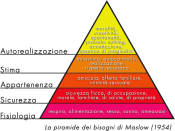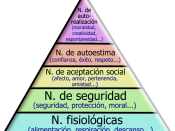Specialization is the only way to achieve expertise. Plato realized that a task becomes easier when one does one thing (p.65). Knowledge was added to Maslow's 1954 Hierarchy of Human Needs Model in 1970 confirming the need to achieve a level of specialization (dividingline).
According to Peak (2007), every organization has a structure that includes specialization (p. 28); a vertical organizational structure (p.88). In fact, the division of labor is specialization and it is "crucial to effectiveness and efficiency in large organizations" or as a sole practitioner. Moreover, organizational specialization refers to confining each and every member of an organized group to a single function. (p. 28). Technical skills involve "specialized knowledge" toanalyze and use the tools of the specialty (p. 45 n60). Each discipline has its own set of skills and tools that must be mastered. For example, police detectives need"technical skills in interviewing, fingerprinting, breathalyzer machines, surveillance, conducting stakeouts, training animals, SWAT, hostage negotiators, hazardous materials team" or computer forensics (p.
45, 65, 89, 102, 163).
Advantages:â¢Delegated Responsibility to a person or group or specific unit for specific tasks within a department specialized and narrowly focused in separate and distinct areas of work like accident investigation, or crime investigation.
â¢Expanding expertise is a natural progression since knowledge is not stagnant. Those with special skills within a department expand on their knowledge learning related or new techniques or skills or learn new technology or processes like homicide investigators learning forensic pathology.
â¢Group spirit, esprit de corp, is a special bond, camaraderie, or team sprit held within a specialty group working together achieving success and dependant on each member individually for the success of the group which increases confidence and solidarity (p. 66).
â¢Increased efficiency and effectiveness is achieved through specialized units trained for specific types of jobs or different types of crime. The specialized training makes the unit proficient at the task and a higher success rate is attained than would be with an untrained unit. An example of expertise through functional differentiation would be a special financial crimes unit to investigate fraud cases rather than the regular detective division (Peak, 2007, p. 66 n5).
Drawbacks:â¢Highly skilled and specialized fields may require higher compensation.
â¢Sometimes, too much knowledge can be a disadvantage for an applicant as held in Jordan v. The City of New London, Conn., 3:97CV1012 (1999) (ruling for the city that high intelligence is an over qualification). Mr. Jordan tested overqualified on an application exam surpassing the window of a preset score parameter on an intelligence test (Peak, 2007, p. 106).
â¢Specialization must be limited in cases where it detracts from the overall goal e.g. too many specialized units, like community and media relations and crime analysis units, yet not enough patrol officers (p.29).
â¢Specialization makes an organization more elaborate confusing communication by increasing the need for teamwork from the specialized units to overcome the conflict it creates (p. 66).
â¢Specialization increases the "need for an organization's coordination" since everyone is not skilled in the same area at the same level, tasks must be completed by available and qualified employees.
â¢"Less flexibility with the tendency to miss the big picture, and/or the failure to coordinate with other units (Hess, 2009, p. 215)References:Dividing Line.com existentialism and Abraham H. Maslow at The Realm of Extentialism, "Abraham H. Maslow: Hierarchy of Human Needs." Retrieved at http://www.dividingline.com/private/Philosophy/Philosophers/Maslow/Abraham_Maslow_Hierarchy_of_Human_Needs.shtmlHess, K. M., & Orthmann, C. M. H. (2009). Introduction to law enforcement and criminal justice. Belmont, CA: Wadsworth Cengage Learning. Retrieved at http://books.google.com/books?id=CdxKm_ypYyMC&pg=PT241&lpg=PT241&dq=pros+and+cons+of+specialization&source=bl&ots=Fob4yu8eiO&sig=X39trwi-0t-IxsdaE6wDaZyfOXw&hl=en&ei=ZSl-S5TVGo-QtgemlrCtDw&sa=X&oi=book_result&ct=result&resnum=6&ved=0CCEQ6AEwBQ#v=onepage&q=pros%20and%20cons%20of%20specialization&f=falsePeak, Kenneth J. (2007). Justice Administration: Police, Courts, and Corrections Management. Upper Saddle River, N.J.: Pearson/Prentice Hall.
YourDictionary.com. esprit de corps. Retrieved at http://www.yourdictionary.com/esprit-de-corps. (group spirit; sense of pride, honor, etc. shared by those in the same group or undertaking. Etymology: Fr, lit., spirit of a body (of persons))




